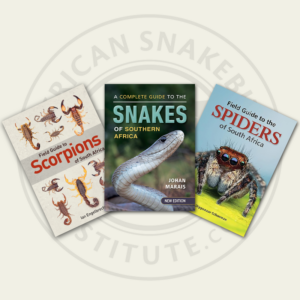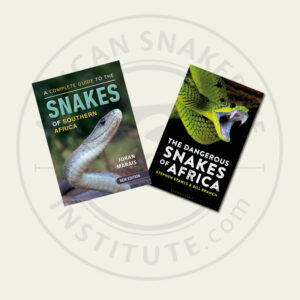Join our WhatsApp Channel for free information about snakes & snakebite as well as notifications of our latest specials!
We have a large presence on social media with well over 500 000 followers over our various pages. Our Facebook group Snakes of Southern Africa is one of the largest and best run wildlife pages in Africa, and members submit dozens of snake pictures daily, asking for assistance with identification.
One of the most alarming things we deal with is when members submit a picture for identification, with the snake posed in or on their hand. This is not very smart.
We’ve seen instances where the snake on the hand is a highly venomous species – how the poster does not get bitten when handling the snake is just amazing.
We have around 176 different types of snakes in Southern Africa and snake identification can be tricky. Even trained herpetologists and avid snake enthusiasts get identifications wrong and this can result in serious bites.
One such example is Bibron’s Stiletto Snake, an inoffensive-looking dark little snake – and which causes a number of snakebites in the summer months, often when people pick one up. These snakes have fangs that can protrude out the side of the mouth even when closed and they cannot be held safely in any manner including when necked (held behind the head).
Necking snakes (grabbing them behind the head) is quite obviously a very dangerous thing to do unless you are trained and experienced in doing so. There are a number of different techniques, and certain techniques should only be used for certain species. Puff Adders are a good example of this – they can push their incredibly long fangs through their lower jaw and puncture the index finger of the person holding them if the grip is incorrect.
Tailing snakes (grabbing snakes by the tail) without the correct training is asking for trouble. We see a number of videos where people try to grab snakes by the tail only to end up bitten. A snake’s natural reaction when grabbed is to strike out quickly to defend themselves. Even seemingly slow looking snakes, like the Puff Adder are incredibly fast strikers (one of the fastest in the world) and they do not hesitate to strike out when grabbed. Don’t do it, it’s not worth the risk, the cost or the damage.
The average serious snakebite in Southern Africa can cost anything from R 100 000 to a million rand to treat.
If possible, avoid using braai tongs or bent coat hangers – they are not designed for picking up snakes and are often far too short.
Using a broom is a good option, the snake can be gently swept into a container and moved away. Make sure your fingers are safe when working with containers.
Whatever you use, don’t use your hands unless you’re 100% certain that the snake is a harmless species.
CONTACT US:
Product enquiries:
Caylen White
+27 60 957 2713
info@asiorg.co.za
Public Courses and Corporate training:
Michelle Pretorius
+27 64 704 7229
courses@asiorg.co.za
 Rangers Book Combo 1
Rangers Book Combo 1
 ASI Combo C
R1,680.00
ASI Combo C
R1,680.00
 ASI Book Combo 1
ASI Book Combo 1

Join our WhatsApp Channel for free information about snakes & snakebite as well as notifications of our latest specials!
Want to attend the course but can’t make it on this date?
Fill in your details below and we’ll notify you when we next present a course in this area:
Want to attend the course but can’t make it on this date?
Fill in your details below and we’ll notify you when we next present a course in this area:
Want to attend the course but can’t make it on this date?
Fill in your details below and we’ll notify you when we next present a course in this area:
Want to attend the course but can’t make it on this date?
Fill in your details below and we’ll notify you when we next present a course in this area:
Want to attend the course but can’t make it on this date?
Fill in your details below and we’ll notify you when we next present a course in this area:
Want to attend the course but can’t make it on this date?
Fill in your details below and we’ll notify you when we next present a course in this area:
Want to attend the course but can’t make it on this date?
Fill in your details below and we’ll notify you when we next present a course in this area:
Want to attend the course but can’t make it on this date?
Fill in your details below and we’ll notify you when we next present a course in this area:
Want to attend the course but can’t make it on this date?
Fill in your details below and we’ll notify you when we next present a course in this area:
Before you download this resource, please enter your details:
Before you download this resource, would you like to join our email newsletter list?